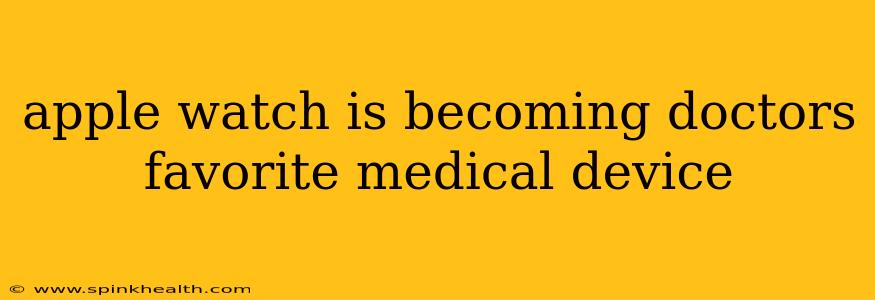The sleek, stylish Apple Watch. You might picture it on the wrist of a busy executive, a fitness enthusiast, or a tech-savvy teenager. But increasingly, you'll find it on the wrists of medical professionals, and even more importantly, their patients. It's no longer just a fashionable accessory; the Apple Watch is rapidly becoming a powerful and surprisingly accurate medical device, earning a place of honor in many doctors' arsenals. This isn't just hype; it's a revolution quietly unfolding in healthcare.
My journey into this fascinating world began with a casual conversation with my cardiologist. He mentioned using the Apple Watch data from his patients to supplement traditional diagnostic methods, highlighting instances where the watch's continuous heart rate monitoring had flagged potential issues that might have otherwise gone unnoticed. This sparked my curiosity, leading me down a rabbit hole of research into the growing impact of this seemingly everyday device on the medical field.
How Accurate is the Apple Watch's Health Monitoring?
This is a question many doctors—and patients—are asking. The truth is, the accuracy varies depending on the specific feature. While not a replacement for professional medical equipment, the Apple Watch's sensors provide remarkably reliable data in many areas. Its heart rate monitor, for instance, has proven consistently accurate in numerous studies, particularly when combined with other diagnostic tools.
Can an Apple Watch Detect a Heart Attack?
While the Apple Watch can't definitively diagnose a heart attack, its ability to detect irregular heart rhythms, like atrial fibrillation (AFib), is a significant breakthrough. AFib is a serious condition that can lead to stroke, and early detection is crucial. The Apple Watch's irregular rhythm notification feature has alerted countless individuals to potential problems, leading them to seek timely medical attention. It's important to remember, though, that this notification is a warning signal, not a diagnosis. A doctor's evaluation is still necessary to confirm any suspicion.
Does the Apple Watch Help with Fall Detection?
Yes, the Apple Watch’s fall detection feature is another game-changer, especially for elderly patients or those with conditions that increase their fall risk. If the watch senses a hard fall and the wearer doesn't respond, it automatically contacts emergency services and notifies pre-selected contacts. This life-saving functionality provides peace of mind for both patients and their families, offering a crucial safety net.
What Other Medical Uses Does the Apple Watch Have?
The applications of the Apple Watch in healthcare are constantly expanding. Beyond heart rate and fall detection, its capabilities include:
- Sleep tracking: Providing valuable insights into sleep patterns that can help diagnose sleep disorders.
- Activity monitoring: Encouraging a healthier lifestyle and aiding in the management of chronic conditions like diabetes.
- Medication reminders: Helping patients stay on track with their prescribed medications.
- Integration with other health apps: Allowing for seamless data sharing between the watch and various healthcare platforms.
The growing body of research supporting the Apple Watch's medical applications is impressive. Doctors are finding creative ways to leverage its data to enhance patient care, improve early diagnosis, and facilitate remote monitoring.
What are the Limitations of the Apple Watch in a Medical Context?
It’s crucial to acknowledge that the Apple Watch is not a replacement for traditional medical devices or professional medical advice. Its data should be considered supplementary, not definitive. Accuracy can be affected by factors like skin tone, movement, and the individual's physical characteristics.
Is the Apple Watch FDA Approved for Medical Use?
While not FDA-approved as a stand-alone diagnostic tool for every condition, several of its features are backed by clinical studies and have shown significant potential for assisting in medical diagnosis and treatment. The regulatory landscape is constantly evolving as research continues to demonstrate the Apple Watch's capabilities.
The Apple Watch's journey from a stylish accessory to a valuable medical tool is a testament to technological innovation's transformative power within the healthcare sector. While it won't replace doctors, it's undoubtedly becoming an increasingly important part of their toolkit, promising a future where proactive health management and early diagnosis are readily accessible. The watch's continuing evolution and the ongoing research into its applications promise even more significant advancements in the years to come.

